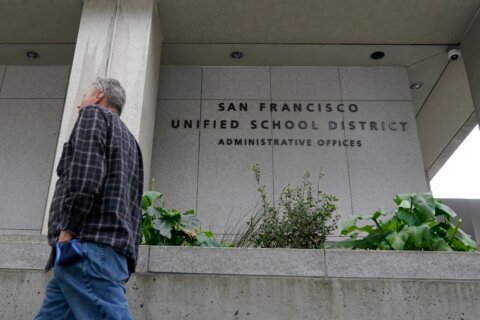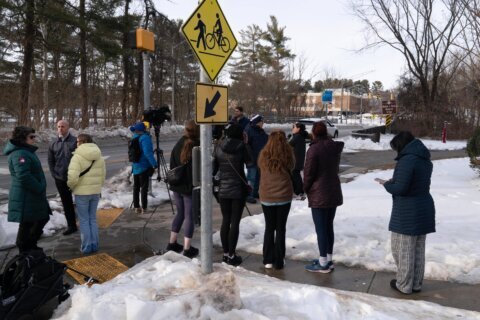Welcome to the School Zone, WTOP’s weekly feature about the latest topics and trends in education across the D.C. region.
What to know about DC-area school systems’ cellphone policies
What it is: Thousands of students across the D.C. region have already gone back to class, and thousands more in the area are scheduled to return Monday.
They may have become comfortable using their phones whenever they wanted during summer break, but they may have to begin restricting their phone usage, depending on where they go to school.
Some school systems leave it up to the school or teachers to decide how to monitor cellphone use, and others have created countywide policies.
What it means: CBS News reported that over a five-year period from 2015 to 2020, there was an 11% jump in the fraction of schools that banned cellphones for nonacademic purposes.
Some educators say cellphones are a distraction for students in the classroom and that use should be limited for the benefit of students’ mental health.
Edu poll
Regional snapshot: Fairfax County Public Schools, Virginia’s largest school system, updated its cellphone policy in June. Under the new guidance, cellphones can’t be used in class or in bathrooms and locker rooms.
The policy allows smartwatches to be worn, but the phone features need to be turned off. The rules are slightly different depending on grade level.
In Montgomery County, Maryland, school system policy states personal mobile devices cannot be turned on until the end of the school day “for independent use.” In middle and high school, teachers have the ability to allow phone use for instructional purposes, and phones can be used during lunch.
For middle schoolers, devices can’t be used in between classes, but high schoolers can use phones between class periods “with principal’s discretion.”
Montgomery County’s policy also includes exceptions for students with a 504 of individualized educational plan.
In Loudoun County, a spokesman told me the cellphone policy was last updated in June 2018. Phones there are allowed in class for instructional use.
Prince William County’s policy is in its code of behavior, and a spokeswoman said there hasn’t been a recent division-wide change.
Talking points: Kilmer Middle School Principal Amy Miller said school leaders made the decision to limit phone use before the county adopted its new policy.
Kilmer student Maya Pedan told me it gets easier to resist the urge to use phones during the day as the school year progresses.
“It’s a good idea because some people try to use their phones, and then, it’s just a very good interacting thing to force kids to interact,” Pedan said.
Teachers at Md. elementary school face unexpected challenges
At one Maryland elementary school, teachers face different challenges as they prepare for the start of a new school year.
I spoke with WTOP’s John Domen to learn more about what it’s like for those educators.
Q: What makes this school different from some others in the county?
A: It probably ranks as one of the most diverse schools not just in the region, but the country. Students from 30 different countries who speak around 20 different languages — you have some who have never been to school before, some whose parents have limited schooling, if any, too. In all, they estimate about three-fourths of the students were either born in another country, or their parents were. And even if they’ve been to school, it doesn’t mean the schooling they’ve had is on par with or even resembling American schooling. A significant percentage of those students are also refugees, so many of them have also seen traumatic things in their lives that many of us can’t even imagine.
Q: What are some of the challenges teachers report facing?
A: Right off the bat, communication with students and their parents can be far more difficult than it is for most other teachers at other schools. And they can’t really take for granted that students feel safe walking in the doors. Little stuff that is routine to most of us can also be a much bigger deal. The siren and loud noises associated with a fire drill are a nuisance. Sirens and the like can bring back memories of far more traumatic experiences. And I mentioned the feeling of safety, kids will get up and leave class to use the bathroom, and before coming back, will go to the other end of the school just to check on younger siblings. Just arriving in the morning, it can be hard for siblings to separate to different classrooms. They’ve been through a lot together. Separating can be anxiety-inducing and even bring back traumatic memories.
[Read John Domen’s story on WTOP.com]
By the numbers
Some data that caught my eye this week.
Back-to-school shots: Over 28,000 students in D.C. are not up to date on their vaccines, according to D.C. Health data shared with the city council.
Students are required to be up to date within the first 20 days of school, otherwise they can’t attend class or participate in extracurricular activities.
[Read more about back-to-school vaccine data on WTOP.com]
What Scott’s Reading
- Prince George’s Co. prepares families for a bumpy start to the school year [WTOP]
- Amid politics and investigations, Loudoun Co. school leader says focus is on learning [WTOP]
- DC schools offer to help enroll migrant children [WTOP]
- Montgomery Co. schools, teachers union reach deal in special ed staffing [WTOP]
- ‘Toughest job I’ve ever done’: Virginia ex-teacher tells why she left [NBC Washington]
- Students on school boards can vote, Maryland high court rules [Washington Post]
- Top education stories to watch this school year [Bethesda Beat]
Field Trip
Here’s a fun thought ahead of the weekend.
Happy Hour: We’re starting the weekend with Happy Hour at Gypsy Kitchen in D.C., and have brunch plans Sunday at Boqueria. Perhaps there will be time to finally see “Top Gun: Maverick” in between.








